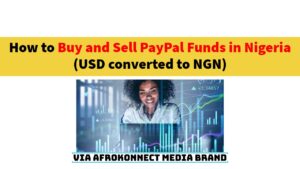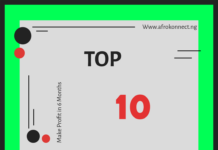
But here’s the challenge: Nigerian PayPal accounts come with restrictions. You can send payments, but you can’t directly receive or withdraw funds (I can create a PayPal account for you that receives payment even in Nigeria, just send me an email with subject CREATE PAYPAL ACCOUNT to [email protected]). That limitation has created a whole new “mini-economy” around PayPal funds — where people buy, sell, and exchange balances every single day.
If you’ve ever wondered how to fund your PayPal account, cash out your balance, or simply trade dollars for naira without falling into the wrong hands, this guide is for you. We’ll break down the Top 5 safest and most reliable ways to buy and sell PayPal funds in Nigeria, highlight the risks, and share insider tips that can save you time and money. Before we proceed here are 10 Best freelance job site to use and make more money.
How to Buy and Sell PayPal Funds in Nigeria
5. Peer-to-Peer Transactions
One of the most common ways Nigerians buy and sell PayPal funds is directly — person to person. Imagine this:
-
A freelancer in Lagos just finished a project on Fiverr and received $200 in PayPal.
-
Meanwhile, an online shopper in Abuja wants to pay for a product on eBay but doesn’t have PayPal dollars.
The solution? They connect, agree on a rate, and swap PayPal dollars for naira.
Pros:
-
Fast and often cheaper since there are no middlemen.
-
Flexible exchange rates that may beat what formal platforms offer.
Cons:
-
It’s risky. If you don’t know or trust the person, you could lose your money.
-
No guaranteed protection unless you use an escrow service (which acts as a trusted middleman).
Tip: Only trade with trusted contacts, long-term partners, or people vouched for by your network. If you’re new, start with small amounts until trust is established.
4. Online Exchange Platforms
Nigeria has built a growing number of digital exchange platforms that specialize in PayPal and other e-currencies. Some popular names you’ll hear are:
-
Naira4Dollar
-
InstantGold
-
Truexgold
These platforms are structured like mini “online banks” where you can buy or sell PayPal funds at listed rates.
How it works:
-
You create an account on the exchange platform.
-
Choose whether you’re buying or selling PayPal funds.
-
Transfer money to their bank account (for buying) or send PayPal funds (for selling).
-
Receive your balance in naira or dollars, depending on the transaction.
Pros:
-
Safer and more transparent than random peer-to-peer trades.
-
Processes are documented, and most platforms have customer support.
Cons:
-
Their exchange rates may be slightly less favorable.
-
Some charge additional service fees.
Tip: Always confirm today’s exchange rate before committing. Rates in Nigeria can fluctuate daily between ₦1,500/$1 and ₦1,800/$1.
3. Freelance Marketplaces with PayPal Withdrawals
If you’re a freelancer, this one might be the most natural way to earn and manage PayPal funds. Platforms like Fiverr, Upwork, and PeoplePerHour allow Nigerian freelancers to receive payments directly into PayPal.
The beauty here is that you don’t necessarily need to buy PayPal funds — you earn them through your work. From there, you can either:
-
Spend directly using your PayPal account (e.g., for subscriptions, online tools, or shopping), or
-
Sell your PayPal balance through exchangers if you need the money in naira.
Pros:
-
A sustainable and legit way to build PayPal funds.
-
You’re essentially converting your skills into foreign currency.
Cons:
-
You still need an exchange service to convert your PayPal balance to naira.
-
PayPal sometimes limits accounts that receive large, sudden payments.
Tip: Keep transaction records and build a consistent income flow to avoid PayPal red flags. Here you can find how to withdraw Paypal funds in Nigeria.
2. Social Media Groups and Communities
Social media has created thousands of micro-markets where PayPal is traded daily. On WhatsApp, Telegram, and Facebook, you’ll find groups where Nigerians exchange PayPal funds — often at competitive rates.
Why people use them:
-
Rates are often better than official platforms.
-
Transactions can be very fast.
-
You can find buyers or sellers almost any time of day.
But here’s the warning:
-
Scam risk is extremely high. Fake screenshots, cloned identities, and “too-good-to-be-true” rates are common traps.
Tip: Never trade in these groups without either:
-
Escrow protection, or
-
A referral from someone you personally trust.
If you’re unsure, you can drop us a comment or send an email via [email protected], and we can guide you on setting up a safe PayPal account that actually receives funds (not free, but secure).
1. Registered Currency Exchange Companies
Finally, at the top of the list, we have professional exchange companies. These are businesses with registered offices, verified websites, and customer service desks dedicated to helping Nigerians convert PayPal funds into naira and vice versa.
Think of them as the “formal sector” of PayPal trading in Nigeria.
Why they stand out:
-
They offer receipts, transparency, and sometimes even same-day payouts.
-
You can walk into an office (or transact online) and know there’s accountability.
-
Many have been operating for years and have built trust with thousands of customers.
Pros:
-
Much safer than peer-to-peer or social media trades.
-
Reliable and professional service.
Cons:
-
Exchange rates might not be the absolute best.
-
May require ID verification for larger transactions.
Tip: If safety is your priority, and you don’t mind slightly lower rates, this is the best option.
Understanding the PayPal System in Nigeria
Before you dive into buying and selling, it’s important to understand how PayPal actually works here:
-
Nigerian PayPal accounts → can only send funds, not receive or withdraw.
-
Foreign PayPal accounts (e.g., US, UAE, Lesotho) → can receive and withdraw funds, making them more flexible.
That’s why many Nigerians open foreign PayPal accounts (sometimes through verified exchangers). But caution: using VPNs or fake details can get your account limited.
Risks, Safety Tips, and Best Practices
Trading PayPal funds can be profitable, but it also comes with risks. Here are safety rules to protect yourself:
-
Never rush transactions. Scammers thrive on urgency.
-
Use escrow when possible. It costs a little but saves a lot.
-
Verify exchangers. Check reviews, social media presence, and years in business.
-
Keep transaction records. Screenshots, chats, and receipts help in disputes.
-
Avoid suspiciously high rates. If the market is ₦1,200/$1 and someone offers ₦1,400/$1, it’s likely a scam.
-
Build reputation. If you want to trade regularly, start small, be reliable, and your network will grow.
The Bigger Picture
The demand for PayPal in Nigeria isn’t slowing down. With more Nigerians freelancing, shopping online, and investing globally, PayPal remains a critical tool — despite its limitations here.
For some, buying and selling PayPal is just a side hustle. For others, it’s a full-fledged business. Either way, with the right knowledge, you can use it to your advantage.
Conclusion about How to Buy and Sell PayPal Funds in Nigeria

Buying and selling PayPal funds in Nigeria is no longer a mystery — it’s a daily reality for thousands of people. From peer-to-peer swaps and social media groups to registered exchange companies, there’s an option for everyone.
But remember this golden rule: safety first, rates second. Losing your money to a scam will always cost you more than a few naira lost in exchange rates. If you’re a freelancer, student, or entrepreneur, mastering these methods will help you manage your PayPal balance effectively and avoid costly mistakes.
And if you ever need help setting up a PayPal account that receives funds, drop a comment saying “I want help” or send an email to [email protected] — we’ve got you covered.
Thanks for reading this guide via Afrokonnect. Don’t forget to share it with someone who might find it useful, and let us know in the comments: Which method do you trust most for buying or selling PayPal funds in Nigeria? On that note, this brings us to the end of this post about How to Buy and Sell PayPal Funds in Nigeria, via Afrokonnect.















